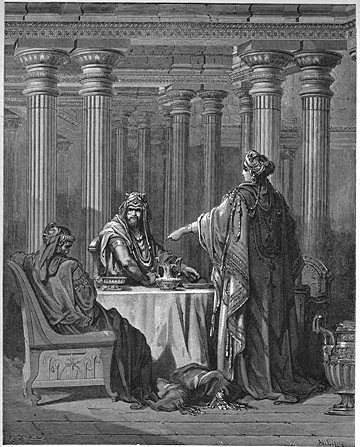Ɛster 7
1 Enti ɔhene no ne Haman kɔɔ Ɔhemmea Ɛster aponto no ase.
So the king and Haman went to feast with Queen Esther.
2 Wɔrenonom nsa saa da no, ɔhene no ka kyerɛɛ no bio se, “Ɔhemmea Ɛster, kyerɛ me nea wopɛ. Wʼabisade ne dɛn? Sɛ ɛyɛ ahemman yi mu fa koraa a, mede bɛma wo!”
On this second day, while they were serving wine, the king said to Esther, “What is your petition, Queen Esther? It will be granted to you. What is your request? Up to half of the kingdom, and it will be granted.”
3 Ɔhemmea Ɛster buae se, “Sɛ Ɔhempɔn ani gye me ho, na ɔpɛ sɛ ɔyɛ mʼabisade ma me a, mʼadesrɛ ara ne sɛ, obegyaa me nkwa ne me manfo nkwa mu ama yɛn.
Then Queen Esther replied, “If I have found favor in your eyes, king, and if it pleases you, let my life be given to me—this is my petition, and I request this also for my people.
4 Efisɛ wɔatɔn me ne me manfo ama nnipa a wobekunkum yɛn, atɔre yɛn ase. Sɛ wɔtɔn yɛn sɛ nkoa kɛkɛ mpo a, anka mɛtena dinn, efisɛ ɛno de, ɛyɛ asɛm ketewa bi a ɛho nhia sɛ wɔde kɔdan ɔhene.”
For we have been sold, I and my people, to be destroyed, killed, and annihilated. If we had only been sold into slavery, as male and female slaves, I would have kept quiet, for no such distress as this would justify disturbing the king.”
5 Ɔhene Ahasweros bisae se, “Hena na ɔbɛyɛ saa? Na hena na obetumi de ne nsa aka wo?”
Then King Ahasuerus said to Esther the queen, “Who is he? Where is this person to be found who has filled his heart to do such a thing?”
6 Ɛster buae se, “Saa omumɔyɛfo ne ɔtamfo yi ne onimguasefo Haman.” Ehu maa Haman ho popoo wɔ ɔhene ne ɔhemmea no anim.
Esther said, “The hostile man, that enemy, is this evil Haman!” Then Haman was terrified before the king and the queen.
7 Ɔhene no de abufuw huruw gyinaa ne nan so, na ɔkɔɔ ahemfi hɔ turo mu. Na Haman kaa hɔ, guan toaa Ɔhemmea Ɛster sɛ ɔnsrɛ ne nkwa mma no, efisɛ na onim sɛ nʼawie adu.
The king got up in a rage from the wine-drinking at the feast and went into the palace garden, but Haman stayed to beg for his life from Queen Esther. He saw that disaster was being decided against him by the king.
8 Ɔtew hwee Ɔhemmea Ɛster mpa a ɔrehome wɔ so no so. Ɛhɔ ara na ɔhene no nso fii ahemfi no turo mu hɔ bae. Ɔhene no bobɔɔ mu se, “Hwɛ ɔrebɛboro ɔhemmea yi bere a ɔwɔ me nkyɛn wɔ fie ha nso?” Ɔhene no kasa wiee ara pɛ, nʼasomfo no kataa Haman anim a ɛkyerɛ sɛ, nʼawie adu.
Then the king returned from the palace garden into the room where the wine had been served. Haman had just fallen on the couch where Esther was. The king said, “Will he assault the queen in my presence in my own house?” As soon as this sentence came out of the king's mouth, the servants covered Haman's face.
9 Na Harbona a ɔyɛ ɔhene no piamfo no mu baako kae se, “Haman asi dua a ne sorokɔ yɛ anammɔn aduɔson anum wɔ ɔno ara nʼadiwo. Na nʼadwene ne sɛ, ɔbɛsɛn Mordekai a ogyee ɔhene nkwa no wɔ so.” Afei, ɔhene no kae se, “Monsɛn Haman wɔ so.”
Then Harbona, one of the officials who served the king, said, “A gallows fifty cubits tall stands beside Haman's house. He set it up for Mordecai, the one who spoke up to protect the king.” The king said, “Hang him on it.”
10 Enti wɔsɛn Haman wɔ dua no a osi maa Mordekai no so, maa ɔhene no bo dwoe.
So they hanged Haman on the gallows that he had prepared for Mordecai. Then the king's rage died down.





















